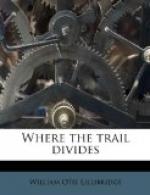Well out upon the prairie, clear of the limits of the tiny town, two men were headed due west, into the night, apparently into the infinite. There was no moon, but here, with nothing to cast a shadow, it was not dark. The month was late October, and a suggestion of frost was in the air: on the grass blades of the low places, was actually present. As was all but usual at that day, the direction they were going bore no trace of a road; but the man astride the vicious-looking roan cayuse who led the way, the same copper-brown man with the corduroys of Bob Manning’s store, showed no hesitation. Like a hound, he seemed to discern landmarks where none were visible to the eye. He rode without saddle or blanket, or spur, or quirt; yet, though he had not spoken a word from the moment they had started, the roan with the tiny ears had not broken its steady, swinging, seemingly interminable lope, had scarcely appeared conscious of his presence. Almost as unit seemed this beast and human. It was as though the man were born in his place, as though, like a sailor on a tiny boat, accustomed through a lifetime to a rolling, uncertain equilibrium, the adjustment thereto had become involuntary as a heart beat, instinctive as breathing. A splendid picture he made there in the starlight and the solitude; but of it the man who followed was oblivious. Of one thing alone he was conscious, and that was that he was very tired; weary from the effect of an unusual exercise, doubly exhausted in the reaction from excitement passed. With an effort he urged his own horse alongside the leader, drew rein meaningly.
“Let’s hold up a bit,” he protested. “I’ve come twenty-five miles to-day already, and I’m about beat.” He slapped the breast pocket of his coat a bit obviously, and as his companion slowed to a walk, produced a silver-mounted, seal-covered flask and proffered it at arm’s length. “The cork unscrews to the left,” he explained suggestively.
The dark figure of the guide made no motion of acceptance, did not even glance around.
“Thanks, but I never drink,” he declined.
“Not even to be sociable,”—the hand was still extended,—“not when I ask you as—a friend?”
“I am a Sioux,” simply. “I have found that liquor is not good for an Indian.”
For a second the white man hesitated; then with something akin to a flush on his face, he returned the flask to his pocket untasted.
Again, without turning, the other observed the motion.
“Pardon me, but I did not mean to prevent you.”
He spoke stiffly, almost diffidently, as on unused to speech with strangers, unused to speech at all; but without a trace of embarrassment or of affectation.
“I do not judge others. I merely know my people—and myself.”
Again the stranger hesitated, and again his face betrayed him. He had scratched an aborigine, and to his surprise was finding indications of a man.




